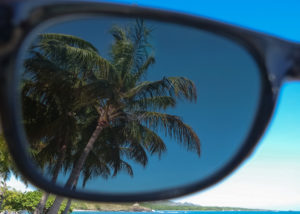By Crystal Hoffert, OD – St. Luke’s Cataract & Laser Institute |
Nothing can be more refreshing on a hot day than taking a dip in one of Florida’s beautiful bodies of water – including salt water, lakes, rivers and, of course, swimming pools.
Fun in the water does not come without risks, but you can keep your eyes safe by following a few ocular safety tips.
1. Wear Goggles
We aren’t the only living creatures swimming in the water. Microorganisms thrive in natural bodies of water so the easiest way to protect your eyes is simply by keeping the water out.
Wear a well-fitting pair of swimming goggles. Be certain to rinse them out when you return home so they’re clean for the next time you need to use them. Prescription goggles are available for certain types of vision impairments. You can also get goggles that are tinted, polarized or mirrored. The most important feature, however, is that they fit properly and provide a sealed environment for your eye.

Dr. Hoffert and her daughter Laila (age 5) looking for some sea creatures
2. Close Your Eyes
When goggles are not available, a good rule to follow is to keep ’em closed! Opening your eyes under the water is never a good idea. In swimming pools, the chemicals are very harsh on our natural eye surface and they can cause burning, stinging, redness, and even allergies. Natural water sources are full of microorganisms that would love to make their new homes in your eyes.
3. Remove Contact Lenses
While contact lenses may feel protective, they actually serve as a great habitat for bacteria – in terms of both getting trapped under the lens and breeding. Contacts lenses should always be removed prior to swimming. Glasses or prescription goggles are both excellent choices if needed.
4. Wear Sunglasses
Don’t forget sun wear! Both stylish and functional, sunglasses provide necessary protection from sunlight. Our skin isn’t the only part of our body that is susceptible to burns. Water enhances the reflection from the sun. This can lead to damage to the cornea, damage to the outer eye tissue, progression of cataract development, and macular degeneration. Look for a pair of sunglasses that provide protection from both UVA and UVB light.

5. Wash Up
When you return home or finish your swim, it’s always a good idea to shower off and remove any irritants or non-natural flora from your body. If you experience any dryness or minor irritation in your eye, preservative-free artificial tears are a good option to restore comfort. If you have major irritation or discomfort, don’t hesitate to call your eye doctor.
6. Know When Something is Wrong
Knowing the signs and symptoms of eye conditions can save you from sight threatening problems. Mild irritation, minimal redness, or itching are common symptoms that can usually be relieved by following the advice above. If you experience symptoms such as pain, decrease in vision, eye discharge, swelling, or moderate unresolved redness or irritation, you should see your eye care professional immediately to prevent permanent vision loss.
7. ENJOY!
Above all, enjoy the beautiful bodies of water that Florida has to offer (while keeping your precious eyes safe and clean).









